Items filtered by date: December 2024
Pickleball and Rheumatoid Arthritis
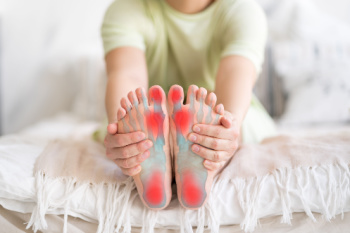
Pickleball, the fastest-growing sport in the United States, offers an excellent way for individuals with rheumatoid arthritis, or RA, to stay active while managing their condition. Unlike tennis or badminton, pickleball’s smaller court and slower pace make it easier on the joints, while still providing a fun, competitive workout. Regular movement is essential for people with RA, as it helps maintain joint flexibility, reduce stiffness, and improve overall mobility. Pairing pickleball with a nutrient-rich, anti-inflammatory diet supports joint health and boosts energy levels, enhancing your ability to play. Proper preparation, including warming up and wearing supportive footwear, is important to avoid strain on affected joints. If you are a pickleball player with rheumatoid arthritis, and if foot pain or joint discomfort becomes an issue, it is suggested that you schedule an appointment with a podiatrist for personalized care.
Because RA affects more than just your joints, including the joints in your feet and ankles, it is important to seek early diagnosis from your podiatrist if you feel like the pain in your feet might be caused by RA. For more information, contact one of our podiatrists of DeCaro Total Foot Care Center. Our doctors will assist you with all of your podiatric concerns.
What Is Rheumatoid Arthritis?
Rheumatoid Arthritis (RA) is an autoimmune disorder in which the body’s own immune system attacks the membranes surrounding the joints. Inflammation of the lining and eventually the destruction of the joint’s cartilage and bone occur, causing severe pain and immobility.
Rheumatoid Arthritis of the Feet
Although RA usually attacks multiple bones and joints throughout the entire body, almost 90 percent of cases result in pain in the foot or ankle area.
Symptoms
- Swelling and pain in the feet
- Stiffness in the feet
- Pain on the ball or sole of feet
- Joint shift and deformation
Diagnosis
Quick diagnosis of RA in the feet is important so that the podiatrist can treat the area effectively. Your doctor will ask you about your medical history, occupation, and lifestyle to determine the origin of the condition. Rheumatoid Factor tests help to determine if someone is affected by the disease.
If you have any questions please feel free to contact our office located in West Hatfield, MA . We offer the newest diagnostic and treatment technologies for all your foot and ankle needs.
Symptoms of Neuropathy in the Feet and Relief Tips
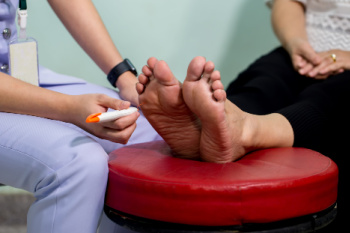
Neuropathy in the feet occurs when the nerves in the feet are damaged, leading to a variety of symptoms. Common signs include numbness, tingling, a burning sensation, and sharp pain in the feet. People with neuropathy may also experience weakness, difficulty walking, and a lack of coordination due to reduced sensation. To find relief, regular walking can help improve circulation and strengthen the feet, which may reduce symptoms. Soaking the feet in warm water with Epsom salt can soothe discomfort and ease muscle tension. Additionally, reducing alcohol consumption is helpful, as excessive drinking can worsen nerve damage and increase pain. Managing underlying conditions, such as diabetes, through proper care and medication, can also significantly help control neuropathy symptoms. If you are suffering from neuropathy in the feet, it is suggested that you make an appointment with a podiatrist for help.
Neuropathy
Neuropathy can be a potentially serious condition, especially if it is left undiagnosed. If you have any concerns that you may be experiencing nerve loss in your feet, consult with one of our podiatrists from DeCaro Total Foot Care Center. Our doctors will assess your condition and provide you with quality foot and ankle treatment for neuropathy.
What Is Neuropathy?
Neuropathy is a condition that leads to damage to the nerves in the body. Peripheral neuropathy, or neuropathy that affects your peripheral nervous system, usually occurs in the feet. Neuropathy can be triggered by a number of different causes. Such causes include diabetes, infections, cancers, disorders, and toxic substances.
Symptoms of Neuropathy Include:
- Numbness
- Sensation loss
- Prickling and tingling sensations
- Throbbing, freezing, burning pains
- Muscle weakness
Those with diabetes are at serious risk due to being unable to feel an ulcer on their feet. Diabetics usually also suffer from poor blood circulation. This can lead to the wound not healing, infections occurring, and the limb may have to be amputated.
Treatment
To treat neuropathy in the foot, podiatrists will first diagnose the cause of the neuropathy. Figuring out the underlying cause of the neuropathy will allow the podiatrist to prescribe the best treatment, whether it be caused by diabetes, toxic substance exposure, infection, etc. If the nerve has not died, then it’s possible that sensation may be able to return to the foot.
Pain medication may be issued for pain. Electrical nerve stimulation can be used to stimulate nerves. If the neuropathy is caused from pressure on the nerves, then surgery may be necessary.
If you have any questions, please feel free to contact our office located in West Hatfield, MA . We offer the newest diagnostic and treatment technologies for all your foot care needs.
Do Your Child's Feet Hurt?
Custom Orthotics For Foot and Heel Pain

Step into relief and reclaim your mobility! Foot and heel pain can be a thing of the past with the right Custom Orthotics. Customized to your unique foot structure, they provide the support and alignment needed to alleviate discomfort. Whether you're walking, running, or simply standing, Custom Orthotics ensure every step is cushioned and pain-free. Don't let foot ailments dictate your day. With Custom Orthotics, embrace a world of comfort and freedom. Call today to schedule an appointment.
Understanding Cracked Heels and Tips to Avoid Them
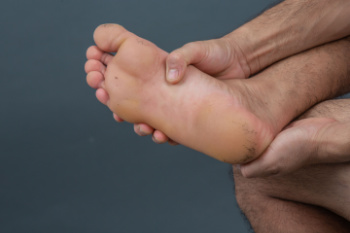
Cracked heels are a common foot condition where the skin around the heel becomes dry, thickened, and eventually cracks. These cracks can be painful and may lead to infection if left untreated. The primary causes of cracked heels include dry skin, standing for long periods, and wearing open-back shoes that expose the heels to the elements. Other factors like obesity, diabetes, or vitamin deficiencies can also contribute. To avoid cracked heels, it is essential to keep your feet moisturized by regularly applying a rich foot cream. Wearing shoes with proper support that protects the heels from external exposure is also important. Avoiding long periods of standing and using a pumice stone or foot scrub to remove dead skin can prevent the buildup that leads to cracks. If you have developed cracked heels, it is suggested that you consult a podiatrist who can offer you effective treatment remedies, which often include prescribed medication.
Cracked heels are unsightly and can cause further damage to your shoes and feet. If you have any concerns, contact one of our podiatrists from DeCaro Total Foot Care Center. Our doctors can provide the care you need to keep you pain-free and on your feet.
Cracked Heels
Cracked heels appear unappealing and can make it harder for you walk around in sandals. Aside from looking unpleasant, cracked heels can also tear stockings, socks, and wear out your shoes. There are several methods to help restore a cracked heel and prevent further damage.
How Do You Get Them?
Dry skin is the number one culprit in creating cracked heels. Many athletes, walkers, joggers, and even swimmers suffer from cracked heels. Age and skin oil production play a role to getting cracked heels as well.
Promote Healing
Over the counter medicines can help, especially for those that need instant relief or who suffer from chronic dry feet.
Wear Socks – Wearing socks with medicated creams helps lock in moisture.
Moisturizers – Applying both day and night will help alleviate dryness which causes cracking.
Pumice Stones – These exfoliate and remove dead skin, which allows for smoother moisturizer application and better absorption into the skin.
Change in Diet
Eating healthy with a well-balanced diet will give the skin a fresh and radiant look. Your body responds to the kinds of food you ingest. Omega-3 fatty acids and zinc supplements can also revitalize skin tissue.
Most importantly, seek professional help if unsure how to proceed in treating cracked heels. A podiatrist will help you with any questions or information needed.
If you have any questions, please feel free to contact our office located in West Hatfield, MA . We offer the newest diagnostic and treatment technologies for all your foot care needs.
How Foot Orthotics Can Help Alleviate Pain From Flat Feet
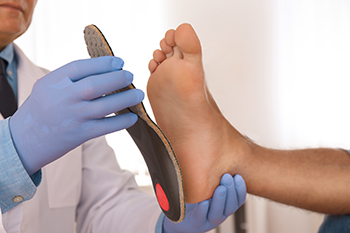
Flat feet, or fallen arches, occur when the arch of the foot collapses, causing the entire sole to make contact with the ground. This condition can lead to pain, fatigue, and difficulty walking, especially with prolonged standing or physical activity. Foot orthotics can be highly effective in alleviating these symptoms by providing essential support to the foot’s arch. Custom-made orthotics are designed to fit the unique shape of an individual’s feet, helping to restore proper alignment and prevent excessive stress on the foot and lower limbs. By redistributing weight and reducing strain on muscles and ligaments, orthotics can improve posture, reduce pain, and enhance mobility. For individuals with flat feet, orthotics offer a non-invasive solution that can make daily activities more comfortable and prevent further complications related to improper foot mechanics. If you have flat feet, it is strongly suggested that you are under the care of a podiatrist who can provide custom-made orthotics for comfort and relief.
If you are experiencing discomfort in your feet and would like to try custom orthotics, contact one of our podiatrists from DeCaro Total Foot Care Center. Our doctors can provide the care you need to keep you pain-free and on your feet.
What Are Custom Orthotics?
Custom orthotics are inserts you can place into your shoes to help with a variety of foot problems such as flat feet or foot pain. Orthotics provide relief and comfort for minor foot and heel pain.
Over-the-Counter Inserts
Shoe inserts come in a wide variety and are used to treat foot pain, heel pain, and minor problems. For example, arch supports can be inserted into your shoes to help correct overarched or flat feet, while gel insoles are often used because they provide comfort and relief from foot and heel pain by alleviating pressure.
Prescription Orthotics
If over-the-counter inserts don’t work for you or if you have a more severe foot concern, it is possible to have your podiatrist prescribe custom orthotics. These high-quality, custom inserts are designed to treat problems such as abnormal motion, plantar fasciitis, and severe forms of heel pain. They can even be used to help patients suffering from diabetes by treating foot ulcers and painful calluses and are usually molded to your feet individually, which allows them to provide full support and comfort.
If you're experiencing minor to severe foot or heel pain, it’s recommended to speak with your podiatrist about the possibility of using custom orthotics or shoe inserts. A podiatrist can determine which type of custom orthotic or shoe insert is right for you and help you take the first steps toward being pain-free.
If you have any questions please contact our office located in West Hatfield, MA . We offer the newest diagnostic and treatment technologies for all your foot and ankle needs.
The Risk of Foot Ulcers Among Diabetics
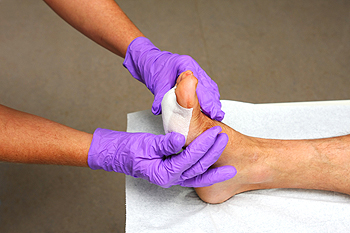
Diabetic foot ulcers pose a severe health threat, often triggered by peripheral neuropathy, which diminishes sensation and allows unnoticed injuries to progress. Compromised blood flow, a hallmark of diabetes, further delays healing and heightens infection risk. These ulcers are evaluated using detailed grading systems, guiding interventions such as surgical debridement to excise diseased tissue, advanced wound dressings to optimize healing, and off-loading techniques to alleviate pain. Infection control is of utmost importance, along with meticulous glycemic regulation to curb inflammation and promote recovery. Surgical intervention, including reconstruction or amputation, may become necessary in extreme cases. Prevention remains key to the management of diabetic foot ulcers. If you are diabetic, it is strongly suggested that you include a podiatrist on your healthcare team who can teach you about vigilant foot care, provide routine monitoring, and care for any foot problems before more severe complications arise.
Wound care is an important part in dealing with diabetes. If you have diabetes and a foot wound or would like more information about wound care for diabetics, consult with one of our podiatrists from DeCaro Total Foot Care Center. Our doctors will assess your condition and provide you with quality foot and ankle treatment.
What Is Wound Care?
Wound care is the practice of taking proper care of a wound. This can range from the smallest to the largest of wounds. While everyone can benefit from proper wound care, it is much more important for diabetics. Diabetics often suffer from poor blood circulation which causes wounds to heal much slower than they would in a non-diabetic.
What Is the Importance of Wound Care?
While it may not seem apparent with small ulcers on the foot, for diabetics, any size ulcer can become infected. Diabetics often also suffer from neuropathy, or nerve loss. This means they might not even feel when they have an ulcer on their foot. If the wound becomes severely infected, amputation may be necessary. Therefore, it is of the upmost importance to properly care for any and all foot wounds.
How to Care for Wounds
The best way to care for foot wounds is to prevent them. For diabetics, this means daily inspections of the feet for any signs of abnormalities or ulcers. It is also recommended to see a podiatrist several times a year for a foot inspection. If you do have an ulcer, run the wound under water to clear dirt from the wound; then apply antibiotic ointment to the wound and cover with a bandage. Bandages should be changed daily and keeping pressure off the wound is smart. It is advised to see a podiatrist, who can keep an eye on it.
If you have any questions, please feel free to contact our office located in West Hatfield, MA . We offer the newest diagnostic and treatment technologies for all your foot care needs.
Explaining Ankle Impingement Injuries
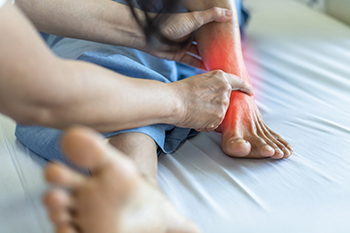
Ankle impingement is a painful condition where soft tissues or bony structures in the ankle become pinched, often following repetitive activities or past injuries like sprains. Ankle impingement can be categorized as anterior or posterior impingement, depending on the location of the pain. Anterior impingement is commonly seen in runners and athletes who frequently bend the ankle upward. This action causes pain in the front of the ankle, particularly during cutting or pivoting motions. Posterior impingement affects the back of the ankle. It is often experienced by dancers and athletes who repeatedly point their toes downward. Symptoms include swelling, reduced range of motion, and discomfort with specific movements. A podiatrist can diagnose ankle impingement through an examination and use X-rays or MRI scans to identify the cause and location of the pain. Treatment options include targeted exercises, orthotics, injections to reduce pain, and in some cases, surgery to restore ankle function. If you are suffering from ankle pain, it is suggested that you schedule an appointment with a podiatrist for treatment.
Ankle pain can be caused by a number of problems and may be potentially serious. If you have ankle pain, consult with one of our podiatrists from DeCaro Total Foot Care Center. Our doctors will assess your condition and provide you with quality foot and ankle treatment.
Ankle pain is any condition that causes pain in the ankle. Due to the fact that the ankle consists of tendons, muscles, bones, and ligaments, ankle pain can come from a number of different conditions.
Causes
The most common causes of ankle pain include:
- Types of arthritis (rheumatoid, osteoarthritis, and gout)
- Ankle sprains
- Broken ankles
- Achilles tendonitis
- Achilles tendon rupture
- Stress fractures
- Bursitis
- Tarsal tunnel syndrome
- Plantar fasciitis
Symptoms
Symptoms of ankle injury vary based upon the condition. Pain may include general pain and discomfort, swelling, aching, redness, bruising, burning or stabbing sensations, and/or loss of sensation.
Diagnosis
Due to the wide variety of potential causes of ankle pain, podiatrists will utilize a number of different methods to properly diagnose ankle pain. This can include asking for personal and family medical histories and of any recent injuries. Further diagnosis may include sensation tests, a physical examination, and potentially x-rays or other imaging tests.
Treatment
Just as the range of causes varies widely, so do treatments. Some more common treatments are rest, ice packs, keeping pressure off the foot, orthotics and braces, medication for inflammation and pain, and surgery.
If you have any questions, please feel free to contact our office located in West Hatfield, MA . We offer the newest diagnostic and treatment technologies for all your foot care needs.

